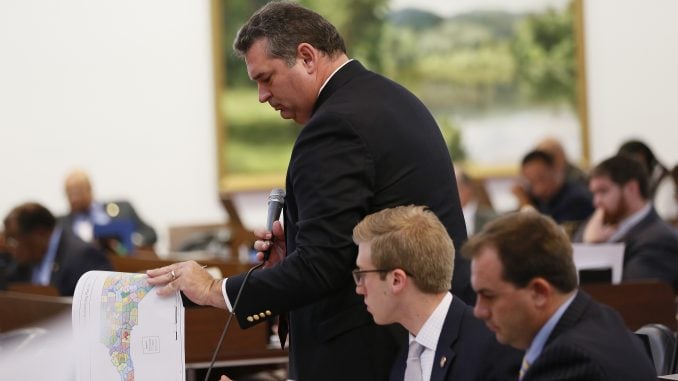
RALEIGH — The North Carolina Senate passed the House’s redistricting legislation Monday night after the House passed it hours before. The votes came after weeks of adopting criteria, considering public input, and tweaking district lines to address members’ concerns.
“I’m very proud of the map that this committee has produced,” said Rep. David Lewis (R-Harnett), chairman of the Joint Redistricting Committee, on the House floor Monday. “We produced a redistricting plan that complies with the criteria that the committee adopted as well, and most importantly, with state and federal law.”
Lewis stated that the current House map is better than any enacted over the past two decades when considering required criteria.
“This map splits 39 counties; the fewest of over two decades of maps,” asserted Lewis. “This map is more compact than maps enacted by the General Assembly over the past two decades. This map splits fewer precincts than maps produced over the past two decades. It splits 39 precincts total, but 30 of those are retained from unaffected county groupings.”
New maps were called for by courts when portions of 2011 Republican-drawn maps were ruled unconstitutional due to racial gerrymandering. The 2017 Joint Redistricting Committee voted to ban the use of racial data in constructing the maps.
The elimination of race considerations has not satisfied Democrats in the General Assembly. Rep. Hank Michaux (D-Durham) reiterated during floor debate Monday that the problem with eliminating race altogether is that “it makes it impossible” to rectify the problems identified in the 2011 maps.

While the vote to approve the map fell mostly along party lines, Democrats were not the only ones offering criticism of how the districts were drawn.
Rep. Larry Pittman (R-Cabarrus) offered an amendment to reverse his own incumbent versus incumbent 2018 contest in the new maps. Pittman argued that he, a relatively new and consistently conservative member, is being pushed out in favor of more tenured lawmakers that ruffle fewer feathers within Republican leadership.
“This is the sort of thing that I believe is causing many citizens in our state and across the nation to demand term limits,” exclaimed Pittman. “They are tired of long-term politicians protecting their own status, as opposed to newer members the people might favor who don’t intend to make a career of it.”
Responding to the amendment, which failed to pass, Lewis expressed regret that such tough decisions had to be made, but re-emphasized that the adopted criteria made such decisions unavoidable. A need to carefully balance criteria was a common response from Lewis as other lawmakers questioned why district lines were drawn across the state.
The committee chairman did adjust district lines in Wake County, and offered a successful corresponding amendment, after House Minority Leader Rep. Darren Jackson (D-Wake) raised concerns that the original construct was less than optimal when considering criteria such as compactness.
“I didn’t see a single place were the split works to the advantage of the Democratic Party, and to the detriment of the Republican Party,” said Jackson.
Lewis, however, explained that such political implications would be found no matter where lines were drawn.
“Every choice, everywhere a line is made, there are political ramifications for where that line falls,” said Lewis. “And one of the reasons that I objected so much in the committee in trying to specify that a precinct or a county could only be split for population purposes, frankly, is I knew where every line went there would be political consequences for it and folks would blame me for violating the criteria.”
Ultimately, Jackson and fellow House Democrats stood against the new maps, claiming that they were flawed with the same old problems.
“I want to state publicly and clearly and for the record that I do not think their plan is racially gerrymandered because my colleagues in this body are racists,” said Jackson. “I do believe their plan is full of racial gerrymander just as the plan from 2011 was found to be. I believe your plan racially gerrymanders so that you can lessen the opportunities of African-American voters to have their voices heard in more districts because that could in turn create more Democratic districts. That is at the core of your supermajority.”
Of the nine criteria adopted to draw new district maps, one specifically prohibited the use of racial data to construct district maps in order to comply with court orders.
“This reflects what the courts have asked us to do,” said Lewis of the maps.
The Senate passed the House version of the maps on Monday night, hours after the House passed them and well before the September 1 deadline. In his floor speech on the issue, Senate Leader Phil Berger took a moment point out that Republican won the majority with Democrat-drawn maps and he warned that the “sea change” in voters turning away from the party in rural areas is less about gerrymandering and more about political platforms.
“Democrats are only competing in 20 to 30 counties across the state. That might be a viable strategy for squeaking out a win in the occasional statewide race, but you can’t build a legislative majority in a state with 100 counties when you only compete in a quarter of them,” he said.
Among the developments in the wake of the new maps, Sen. Bill Cook (R-Beaufort) announced that he would not seek re-election. Cook represents District 1 in the N.C. Senate and his is among those that shifted in the new maps, putting him in a overlapped area with another incumbent.
“As much as I love the folks of eastern North Carolina, I love my family more,” Cook said in Tuesday’s statement.




